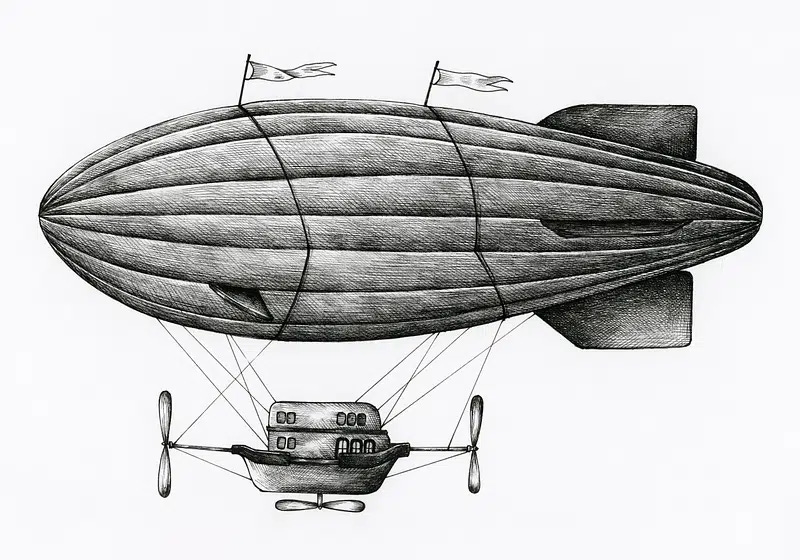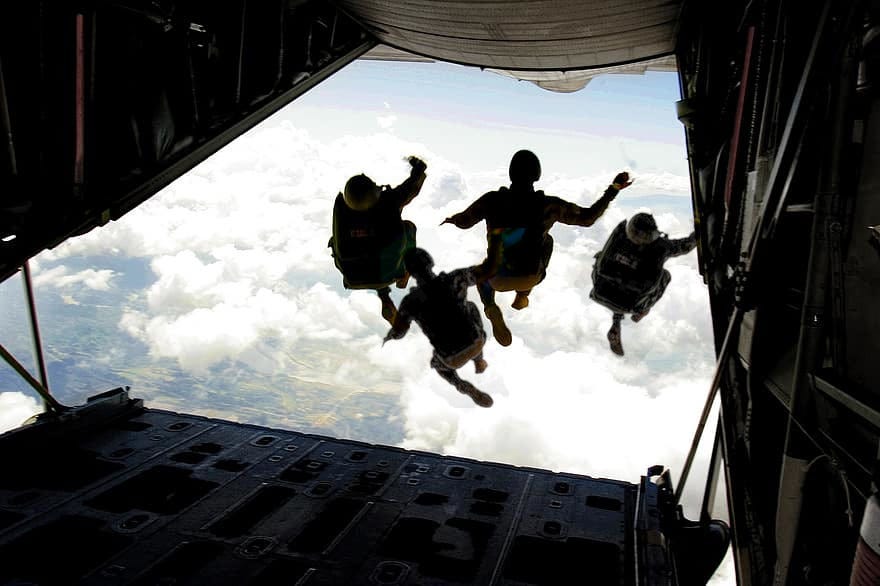Trueman had been surprised to learn that they would not be travelling with the main intervention party.
“No,” grinned Annest, lead coordinator of their small group. “We're hitching a lift on a special transport. Be coming up soon, over there. We'll catch it from a clearing.” She waved vaguely towards the north.
“Excellent,” Trueman couldn't help it, he felt excited. “Some sort of jet aircraft? A vertical take-off copter thing?”
Nonna burst out laughing and squeezed his hand.
“Something like that!”
Sure enough, after only another half an hour or so, Jodi raised her shaved head to stare in that direction as a grey mass seemed to rise ponderously above the distant horizon. At first Trueman was reminded of those damn hippos but as the thing came nearer he felt that now all too familiar feeling, a combination of disappointment, confusion and just sheer disbelief as the large object loomed closer. A gas bag, he muttered internally, I thought Zepplin's went out a century ago.
Annest was amused at his reaction.
“Cheer up matey, its got comfy seats and you can get a decent cup of tea!”
Now, sitting admittedly comfortably in the passenger cabin of the dirigible, having finished a very pleasant cup of tea, Trueman flicked the new body’s tongue and the soft voice of Laurence's hand-held fell silent. Looking out of the window he observed dispassionately the landscape below; the rise and fall of forest covered hills with the centres of population largely invisible, shrouded in green, had long since receded. They'd crossed sea, then more land, less and less green, occasional dark areas, blackened by fires until now the greys and browns below began to match those of their clothes.
He cradled Laurence’s portable in one strong hand and killed the phase cancellation, allowing the flood of background sound to return. The dirigible's engines provided both a shrill whine and a dull roar, generating a discernible vibration even in the cushioned seating. The Last Resort cantref, while admittedly performing some remarkable feats of co-ordination, obviously did not place undue emphasis on sophisticated transportation, practical being the operative word. There was also a not too pleasant smell resulting from the burnt bio-fuel which reminded Trueman, rather accurately as it happened, of a mean chip shop owner who had delayed changing the oil in the fryers to save money.
Though the bulk of the intervention party were travelling by other means, the advance units being provided with air transport by the remnant UN, this dirigible, apparently borrowed from a northern city1, was transporting mainly cargo; the rear area, rather like a very large shed, was piled high with pallets of equipment under netting and straps. Seated immediately on his right was Nonna. She gave his upper thigh a squeeze. Trueman jumped and covered his awkwardness by rubbing the new body’s eyes. He had difficulty with the medic's very tactile approach, rather different from his past experiences with doctors.
Having learned at least one lesson from Rhia, Trueman had not refrained from questioning her.
“the volunteers are designated as a Temporary Support Tribe,” she explained, “For the purposes of the intervention, under the co-ordination of reps from our lot, the Last Resort cantref; we specialise in this sort of thing”.
The drab grey and brown uniforms were designed to suit the terrain and environment of their destination. The only distinguishing features were several variations of coloured bands on the upper arms.
“All us old country people are generalists,” Nonna said, “but we’ve got our own interests as well, our specialisms. That’s what the bands are for, they show the families.”
The Temporary Support Tribe as a whole was thus subdivided into overlapping families, she went on, such as support, healing, tactical, transport, nutrition, counselling, construction and a small number of warriors, better described as martial artists. There was even a group of bodgers who had cultural knowledge of the area and also singers and storytellers. Some people could be in more than one family, this overlapping allowing for the easy increase or decrease of numbers depending on the requirements of the immediate situation.
In all, about 350 volunteers were leaving from the Phat Party Field, which, according to Nonna, was a fair sized tribe. The large numbers of camp followers, as Nonna described them, were made up of old country folk who had come to see the volunteers off, being as this intervention was considered to be extremely dangerous and some of the members of the tribe may not return. This made it an especially good opportunity for a party which, from what she said, had been running for at least three days and would probably continue even after the Temporary Support Tribe had left.
“The families operate as separate units that provide and request services from one another in order to achieve an overall task,” Annest chimed in from his left, almost as if she was reading, Trueman thought, from the patch covering her left eye.
“Like OO,” Trueman said spontaneously. “Object oriented programming,” he explained sheepishly when Annest and Nonna looked blankly at him.
“The Support Tribe will concentrate on the disaster survivors fleeing the urban areas,” she continued with the story, “They’ll be passed on by the Acting Tactical Tribe who are right in there. The immediate work will be support for trauma relief; that's just the start of an ongoing process. Then there's the physical relief work which means moving survivors out into the country and setting up temporary camps and cropping systems. Each stage of the support work involves the training of local people to share in and eventually take over the operation.”
“Don’t tell anyone,” Nonna said in a mock stage whisper, her hand over her mouth, “But the temporary relief camps are in fact the first stage in a sustainable cultural and environmental design which will be developed by the local populace, with support from our lot where required. We’ve no intention of rebuilding the towns; its much easier just to help them start something better."
Trueman was thoughtful. There was so much idealism here, yet these people seemed to see it as realistic, achievable. Was there a contradiction? He'd also learned that he had in fact been kidnapped. It didn't come as much of a surprise.
Later, with Nonna still crushed against him, Trueman pulled more details from Laurence’s hand-held. Generalists, Nonna had described the cantrefi people as generalists. He called up old country education and the hand-held projected a moving image onto the back of the seat in front, displaying groups of people involved in what were described as action learning programmes. Trueman could not tell which were the students and which were the teachers.
He listened to the soft voice provide a commentary and was surprised to learn that the primary subject taught was gardening which, according to old country education, covered everything. This was made up of a web of topics which included design, ecology, games, animal behaviour, human relationships and group dynamics, nutrition and cookery, conflict resolution, creative expression, biology, practical woodworking, martial arts, consensus building, systems thinking, autopoiesis and counselling, amongst others. He was about to delve into the details of the applied mathematics subject area when Annest leaned over from his left. She was grinning.
“Come on, lovers,” she hissed, “we’re getting off here.”
There was little time for Trueman to object as a pack was stuck on his back and a thin-walled helmet on his head. A visor slid over his face as he was led to the rear of the cargo section and through a bulkhead into the storage hold. To his horror, a large part of the floor at the rear of the compartment pivoted downward, accompanied by a huge increase in engine and wind noise. A landscape was revealed far below, mottled grey and brown. A good match with the suits, he thought, numbly, as they lined up on the brink, Annest on his left, Nonna gripping his arm tightly on his right. Jodi took extreme left.
“Where are we going to land?” He shouted.
Jodi gave him a puzzled look then walked casually along the end of the ramp, checking each of their packs and harnesses.
“OK people!” she snapped, returning to her position to their left, “Let’s do this!”
The three women, pulling Trueman with them before he had time to react, took two steps, the last one into empty space, yelling unintelligibly, their combined voices drowned completely by the din of the engines.
Trueman joined in, not through choice. The only thing that came to his mind as they plummeted through the slip stream with the grey and brown, mottled landscape swirling below them, as he began to scream, was an image of burnt chips.
Images from the public domain, the last one doctored by me. As always, comments are both welcome and useful, in that I get to hear something of what you think and can steer the work accordingly. Also, please remember, your suggestions for techniques, strategies, incidents, locations, ideas, characters or otherwise to include in the patafiction Konsk, are all welcome- the work is still, at this stage, immensly flexible. many thanks. Hwyl! Chris.
I am indebted to Andy Goldring of the Leeds bioregion, for the northern city's dirigible. Andy described to me his vision for the Leeds Zepplin and the Twin Towers of Leeds, being the Tower of the Unsustainable (i.e. destructo-culture) and the Tower of Regeneration (namely, permaculture design).
Learners and other visitors would progress up the first tower learning about the unsustainable systems and practices of the abandoned culture. On reaching the roof, they would enter the passenger cabin of the Leeds Zepplin and would then be taken for a grand, bird's-eye tour of the city and the bioregion which supported it before returning to land on the roof of the second tower. Descending through this tower they would learn about the sustainable and regenerative practices of the new culture.
I think the Leeds collective could be persuaded to loan out their dirigible to the Last Resort cantref in an emergency.





